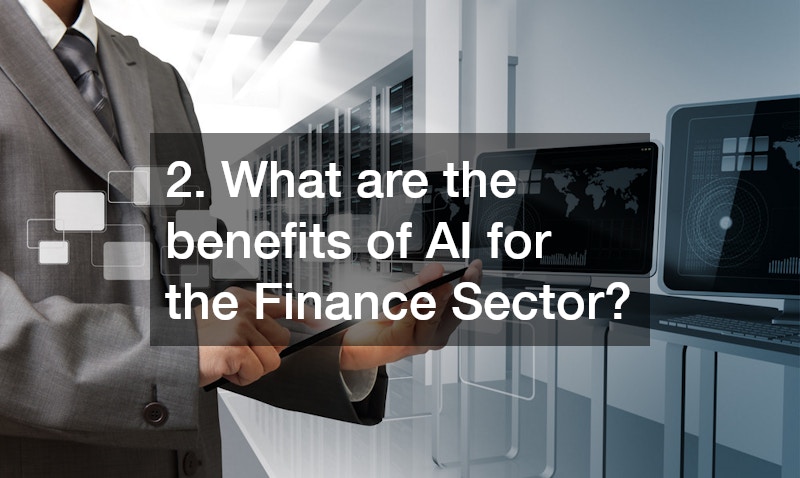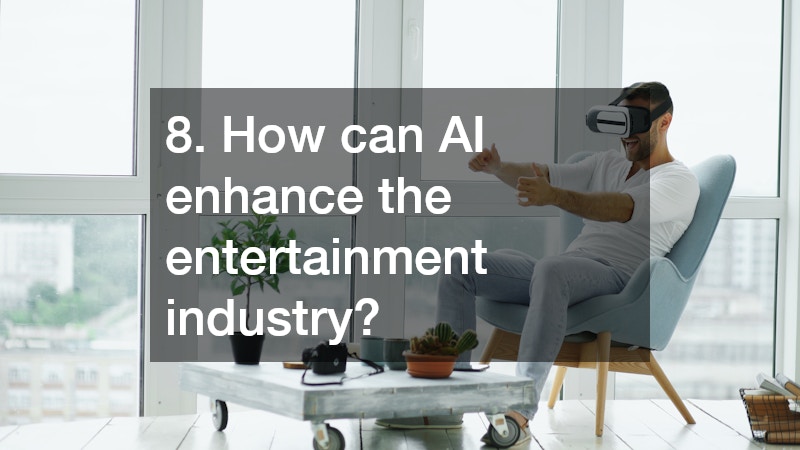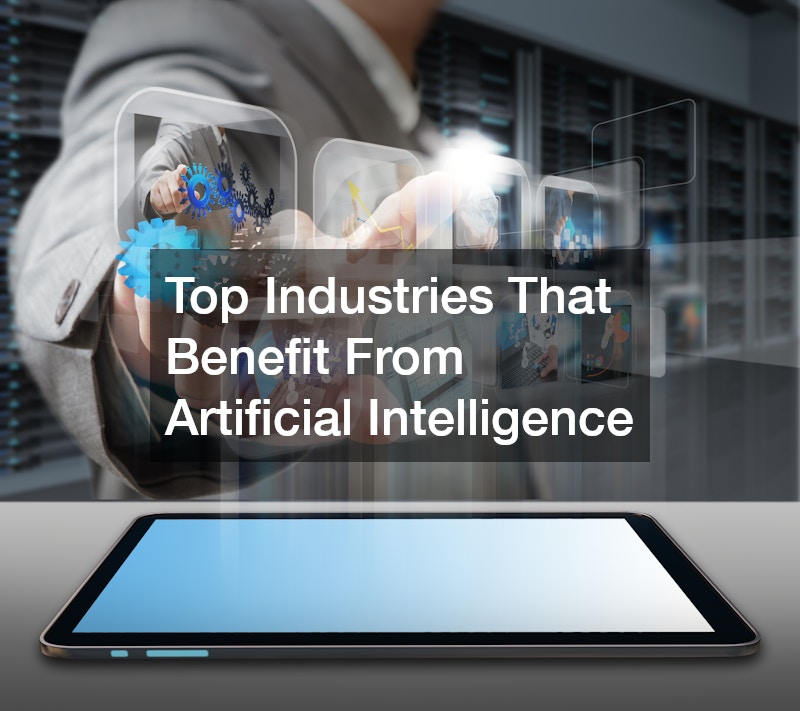Artificial Intelligence has been a game changer in many sectors. It is a technology that fosters innovation and efficiency. AI offers a wide range of opportunities, from healthcare providers using PDO-cleared threads to streamline treatment to auto detailers increasing their visibility with auto detailer SEO services. This article will examine how industries, from agriculture to finance, are using AI to improve customer experience, create smarter processes, and drive profitability.
AI integration is not only for large companies. Small businesses such as local civil engineers who use predictive analytics to plan infrastructure projects or dentists using intelligent scheduling systems are also reaping the benefits. The increasing availability of data allows industries, from education to emergency clinics, to harness AI tools in order to make more data-driven decisions. Understanding AI’s wide-ranging implications will help companies position themselves in a rapidly changing market.
We will explore the impact of AI on various industries, including healthcare, finance, retail, and more. This exploration will highlight specific roles AI has and the benefits it brings to various industries. It will also show how credit union data processors are revolutionizing financial transactions. This article will inform you of the many possibilities AI has for industries. It doesn’t matter if you are a corporate decision-maker, a business owner, or just curious about technology.
1. How does the healthcare industry use AI?
AI has had a major impact on the healthcare industry, especially in areas like diagnostics, patient care, and administrative tasks. Emergency clinics, for example, are using AI algorithms to analyze patient data quickly and improve patient outcomes. AI-powered advanced imaging technology has improved diagnostic accuracy, allowing doctors to detect diseases sooner.
AI is able to predict and personalize treatment based on patient characteristics. AI allows healthcare providers to analyze large datasets of previous patients in order to optimize treatment plans, and to increase patient satisfaction. AI-driven virtual assistants can also help healthcare professionals manage their appointments and medications.
AI-powered predictive analytics also helps to understand patient behavior, which leads to better healthcare services. AI can help healthcare facilities to tailor interventions by analyzing factors like previous visits and claims. This application of AI is not only beneficial to patients, but it also helps reduce operational costs.
2. What are the benefits of AI for the Finance Sector?

Finance sector has adopted AI algorithms rapidly to streamline operations, improve decision-making and enhance the efficiency of their processes. Automation of routine tasks can be used to free up time for financial analysts and accountants. AI-driven systems are able to process high volumes of transactions and monitor for fraud. They can also provide insights based on real-time data from the market, which improves overall customer experience.
AI technology allows credit unions access to a data processing service which can be used for the analysis of customer data in order to make better lending decisions. Credit unions can reduce default risk by integrating machine-learning models and personalizing loan offers. This improved understanding improves not only customer trust, but also the overall stability and security of financial institutions.
AI also helps in investment management. Robo-advisors offer clients tailored investment strategies that are based on financial goals and tolerance for risk. The accessibility of advanced financial tools allows individuals to take advantage of investment opportunities for less cost. AI in finance will ultimately transform traditional systems into dynamic and streamlined operations which increase efficiency and profitability.
3. How AI is revolutionizing the Retail Industry
AI is transforming the retail industry in a way that has never been seen before. AI gives retailers powerful tools for improving customer experience, from inventory management to personalized marketing strategies. This is useful for predictive analytics, which allows businesses to better forecast demand, control stock levels, and reduce waste.
AI-driven chatbots, for example, can improve customer service through instantaneous responses to questions, thus improving satisfaction and engagement. Marketers are also increasingly using AI to analyze the shopping habits of consumers, which allows retailers to customize promotions and offers to resonate with certain demographics. Businesses that use auto detailer seo for digital marketing enjoy five-star reviews. This highlights the importance of customer interaction.
AI also reshapes the in-store shopping experience by enabling retailers, through analysis of data on past purchases and preferences, to make personalized recommendations. In clothing stores, smart mirrors use AI to help shoppers visualize their outfits. Mobile applications also offer personalized offers to boost sales. AI is a key component of retailers’ strategies to boost brand loyalty and increase competitive advantage as they continue to navigate changing consumer behavior.
4. What role does AI play in manufacturing?
AI’s transformational power is apparent in the manufacturing industry through the optimization and management of supply chains. AI is now used by companies to monitor the health of machinery, predict maintenance requirements, and reduce downtime. This ensures smoother operations. Automation, using robotics and AI, has increased efficiency on production lines.
AI also improves resource management. This allows manufacturers to maximize output and minimize waste. Predictive analytics is able to identify inefficiencies, and then propose solutions that can lead to significant cost savings. AI algorithms are also able to analyze consumer trends and market trends, which allows factories to stay ahead of the competition and adjust production accordingly.
AI-driven machines are also able to work with humans, improving the safety of workplaces and reducing risks related to hazardous tasks. Integration of these systems encourages innovation and adheres to regulatory compliance standards. Manufacturing evolves as it embraces AI. The industry has become more responsive and agile, leveraging technology to adapt to the changing landscape of manufacturing globally.
5. How does the Transportation Industry use AI?
AI technology is transforming the transportation industry, improving safety and efficiency on the road. AI systems are used to process sensor data and navigate autonomous vehicles. This technology can reduce the number of accidents that are caused by human errors, making transportation safer.
AI can help logistics companies optimize delivery routes, improve fleet management, and reduce fuel consumption. AI can improve service speed and reduce fuel consumption by analyzing traffic patterns. These efficiencies reduce operational costs and contribute to a sustainable transportation ecosystem.
AI systems in public transport can improve scheduling, maintenance, and service quality. They reduce wait times and increase customer satisfaction. Commuters can benefit from AI-driven applications that offer real-time updates about bus and train schedules. These advancements continue to improve the user experience while streamlining operations. This will lead to a more efficient and integrated transportation system.
6. What is the impact of AI on education?
AI-driven platforms allow for personalized learning by adapting the course content to meet the needs of each student. These systems tailor learning paths based on performance data. This increases student engagement and improves outcomes.
AI tools can also help educators automate administrative tasks, such as attendance tracking and grading. This automation allows teachers more time for direct instruction and interaction with students. AI-driven analytics also allows for the identification of students who are struggling and can be supported with timely interventions.
AI-powered virtual tutors are revolutionizing the way students study, offering on-demand help when needed. These intelligent systems are able to offer real-time explanations and practice problems, which will help students master subjects. The education sector will undergo a major transformation as schools and universities explore AI’s potential.
7. How is AI used in agriculture?
AI revolutionizes farming practices in agriculture by providing insights to improve yields and reduce the consumption of important resources. Precision farming techniques use AI data analysis for monitoring crop health and automating irrigation systems. This targeted approach maximizes production while conserving water and other inputs. It leads to more sustainable farming practices.
AI technologies, such as drones, sensors, and other AI-based devices, collect data in real time, which allows farmers to make better decisions about soil health, weather patterns, and crop conditions. These insights can be used to optimize planting schedules and manage pests more proactively. The agriculture sector has seen an increase in product quality and efficiency.
AI also helps in the supply chain management of the agricultural sector by improving logistics and distribution. AI is now used by farmers to forecast consumer demand and ensure that their products are delivered on time. This intelligent planning reduces waste, and allows for a more efficient approach to meet consumer needs on the ever-evolving market.
8. How can AI enhance the entertainment industry?

Entertainment is going through a transformation as AI technologies change the way content is produced, distributed and consumed. AI algorithms are used by streaming services to make personalized recommendations for content based on the viewing habits of viewers. This level of personalization increases user engagement and satisfaction, leading to higher retention and viewing rates.
AI can streamline the production process for the music and film industries. AI tools help evaluate potential box office and optimize production costs. This data-driven method allows producers and creators to make well-informed decisions.
AI-generated content is also opening up new creative frontiers. AI systems are now able to compose music, make animations and even write scripts. This enhances the artistic process. This collaboration of AI and human creativity may lead to new storytelling methods that will forever change the entertainment industry.
9. What are the applications of AI in real estate?
AI has made significant progress in the real estate industry, enhancing property management, investment, and sales strategies. AI algorithms are able to analyze large datasets of market conditions, consumer behavior and pricing trends. This allows real estate agents and brokers to identify profitable investments and set competitive prices. This data-driven method ensures that all stakeholders are able to make accurate decisions using accurate analytics.
AI-powered CRMs also streamline communication between real estate agents and their clients. This allows them to offer tailored services that meet specific client needs. These systems automate appointment booking, lead tracking, and property recommendations to meet the demands for quick and personalized service. This integration of technology not only increases productivity but also customer satisfaction.
AI applications can optimize maintenance schedules in property management and reduce costs. Predictive analytics can predict HVAC failures and prompt timely interventions. Improved efficiency and effective property management help property owners achieve better tenant experience and retention rates.
10. What are the benefits of AI for the energy sector?
AI is playing an increasingly important role in the advancement of energy efficiency and sustainability. AI-powered smart grids can analyze patterns of energy consumption and adjust the supply accordingly. This leads to optimal energy use and lower costs. This technology is a win-win for utilities and consumers, as it promotes a more efficient model of consumption.
AI also facilitates the predictive maintenance of energy infrastructure by monitoring continuously equipment performance and health. Companies can minimize downtime by preventing failures from occurring. These efficiencies result in cost savings for consumers and increased energy reliability.
AI can also help integrate renewable energy sources in power grids. AI systems are able to contribute to a more stable management of energy supply by forecasting solar and wind production. This helps to support global efforts to switch to cleaner energy sources while maintaining grid reliability.
Conclusion
The opportunities that artificial intelligence presents span a wide range of industries, including healthcare, agriculture, and more. Each industry is finding new ways to use AI to improve operations, promote innovation, and enhance customer experiences. We’ve seen how AI drives advancements in different sectors. Examples include FDA-cleared PDO threads for healthcare and credit union data processor services for finance.
The integration of AI technology is paving the way for a future that’s more data-driven and efficient. From DUI lawyers to DUI insurance agents, from surveillance services to home and auto insurers, AI will be a key component in a future where we are all more data-driven and efficient. The question of whether or not to use AI is no longer relevant. It’s more about how to harness its capabilities. Businesses can take advantage of the potential of AI by understanding it and leveraging its capabilities.
